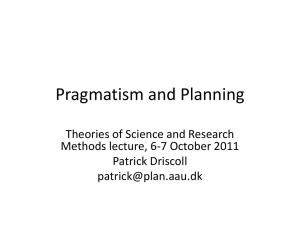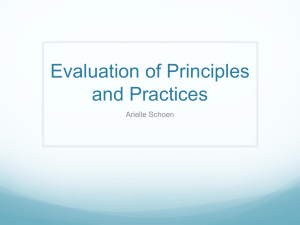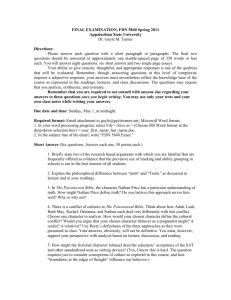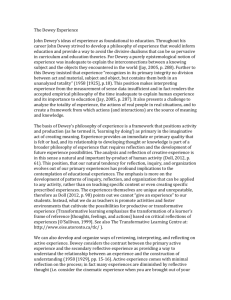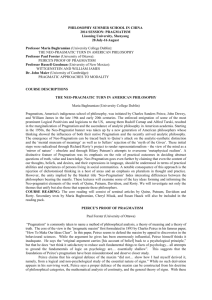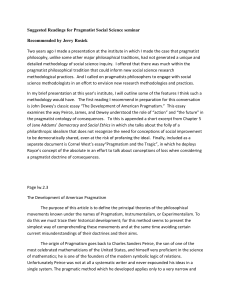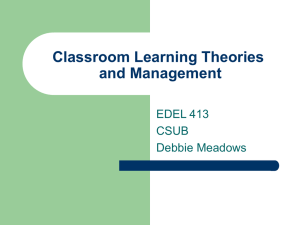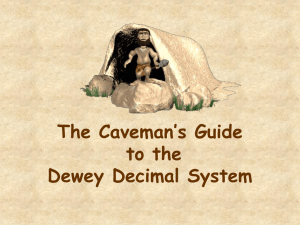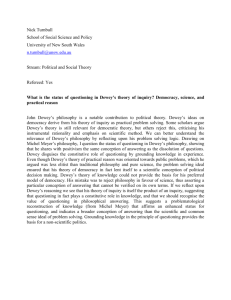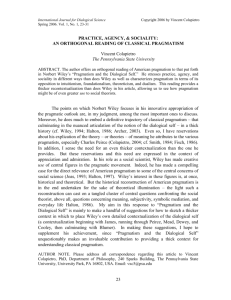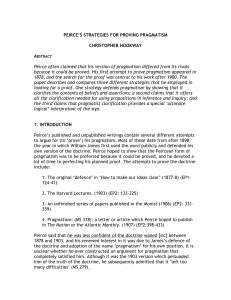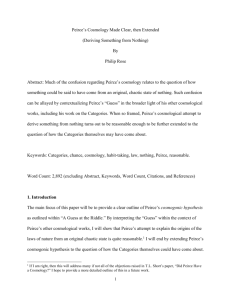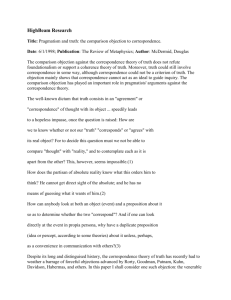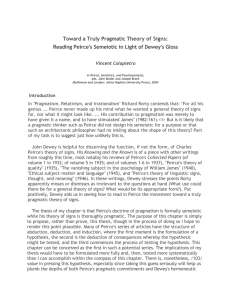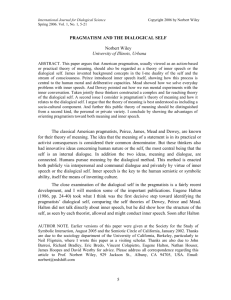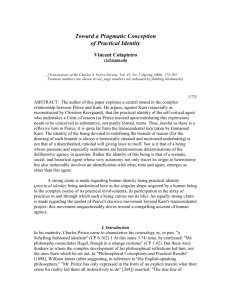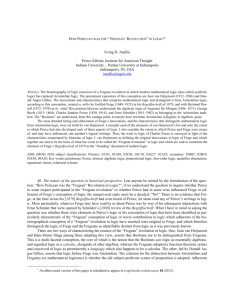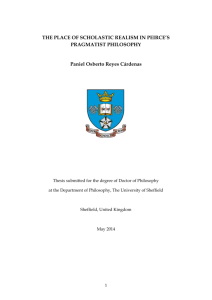Sample Syllabus - The George Washington University
advertisement
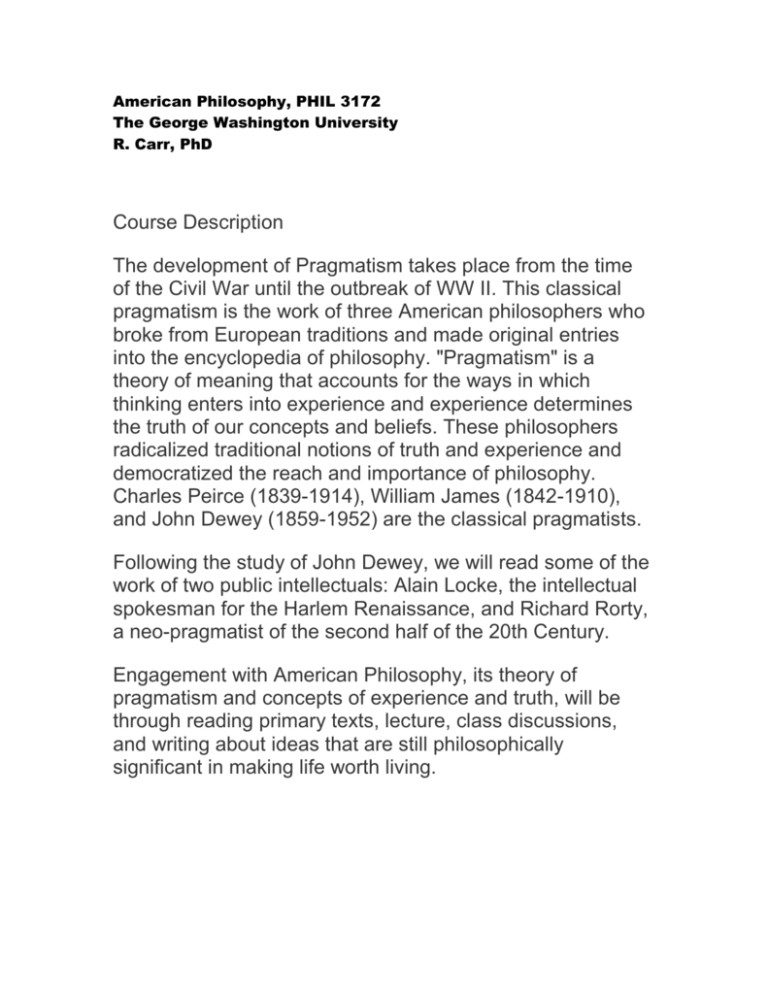
American Philosophy, PHIL 3172 The George Washington University R. Carr, PhD Course Description The development of Pragmatism takes place from the time of the Civil War until the outbreak of WW II. This classical pragmatism is the work of three American philosophers who broke from European traditions and made original entries into the encyclopedia of philosophy. "Pragmatism" is a theory of meaning that accounts for the ways in which thinking enters into experience and experience determines the truth of our concepts and beliefs. These philosophers radicalized traditional notions of truth and experience and democratized the reach and importance of philosophy. Charles Peirce (1839-1914), William James (1842-1910), and John Dewey (1859-1952) are the classical pragmatists. Following the study of John Dewey, we will read some of the work of two public intellectuals: Alain Locke, the intellectual spokesman for the Harlem Renaissance, and Richard Rorty, a neo-pragmatist of the second half of the 20th Century. Engagement with American Philosophy, its theory of pragmatism and concepts of experience and truth, will be through reading primary texts, lecture, class discussions, and writing about ideas that are still philosophically significant in making life worth living. Learning Objectives Analysis: 1.Read critically philosophical texts. Improve one's ability to determine what is significant and what is insignificant. 2.Understand and analyze the logical structure of specific philosophical arguments. 3.Sharpen and deepen one's ability to think abstractly and to form clear concepts. Writing: 1.Become attentive to the writing of different philosophers and think about the relationship between the style of writing and philosophical content. 2.Improve one's writing. Understand that good writing results from a practice of drafting, reworking, rethinking, and writing again. 3.Write philosophical papers that are lucid, well-argued, and supported by specific primary texts, not by secondary texts. 4.Write papers for a general audience that express sophisticated ideas without a technical vocabulary. Content: Understand the main features of American Philosophy and how they play out in Peirce, James, Dewey, Locke, and Rorty. Specifically… 1. Thought is purposive. 2. Thought is fallible. 3. Radical Empiricism is more accurate than traditional British Empiricism. 4. The scientific method is the best method that we currently have to fix our beliefs. 5. Pragmatism is a method, not a systematized set of claims about the world. 6. Truth is a concept and all concepts are plastic. 7.The individual is embedded in a community. 8. What we think and what we do can change the world for the better. Required Texts The Essential Peirce Vol 1., edited by Houser and Kloesel Pragmatism, W. James (may get online- Gutenberg Project) The Essential Dewey, Vol 1, edited by Hickman and Alexander Recommended Texts The Metaphysical Club, Louis Menand America's Philosophical Vision, John Smith Course Requirements and Grading This philosophy course is a WID course. You will be writing 3 papers of 6-7 pages each and 1 final essay. Of course, writing papers is an essential element of any philosophy course. In writing, one is forced to get clear about what one under and what one wants to communicate with others. We often understand the text and can parrot its words, but search to put the idea into our own words or really understand it once we move from the specific language of the text. Good writing comes from reading well-written essays and books and articles, but it also comes from effort and the willingness to make that effort. That this is a WID course means that we reflect on the writing of the American pragmatists and we will reflect and evaluate our own writing. We will discuss the art of writing and we will practice it. I will help you evaluate your writing and your peers will as well. Reading another's writing and evaluating it helps enormously in seeing anew our own writing. James is a wonderful writer; his brother is Henry James. James' style of writing is colloquial...he is talking to his audience, to his reader. Delightful to read, but is James philosophically shallow? Is he philosophically clear? We will discuss this and your first paper will be a critical analysis of one of James' works and your commentary. Peirce is a philosopher's philosopher and his writing is seriously dense and logically argued. Your paper on Peirce will be a "book review" for a scholarly journal. This will require you to understand Peirce's arguments, sift out the significant from the insignificant, and then convey what you understand to another scholar. Dewey has some technical vocabulary and some important conceptual analyses, esp. of "experience." But Dewey also seems very easy to read. He was an important public intellectual and wanted to convey his ideas to the people of this country. For your Dewey paper, you will write an op-ed piece for public consumption on an important social issue. The final essay will require comprehension and mastery of a number of concepts and the ability to argue a thesis using appropriate evidence. Grading 20%- textual analysis and critical commentary -paper on James 25%- scholarly book review-paper on Peirce 25%- op-ed article on education-paper on Dewey 30%-comprehensive test and final essay question, according to GWU final exam schedule Class Policies You are expected to attend class. After three unexcused absences, your grade will be lowered. You are expected to take your responsibilities as student seriously and to study assigned readings both in preparation for class and after class discussion. Work is due at class time. I will want a hard copy of your papers. Late work will not be accepted unless the absence is excused. Excused absences are: documented illness of the student, death of a family member, or religious observance. Please let me know the first week of class the dates you will be absent for religious observance. Let me know if you need academic accommodations. Disability Support Services office is 202-994-8250. My office is Phillips 508 and my office hours are TBD. You may always reach me by email- rcarr@gwu.edu or by phone 703-474-6949. Academic Integrity There will be zero tolerance for cheating of any kind, including misrepresenting one’s own work, taking credit for the work of others without due credit, fabricating information, etc. Please check with me if you have any questions. The site for The George Washington Code of Academic Integrity is http:/www.gwu.edu/~ntegrity/code.html. University Counseling The University offers 24/7 assistance and referral to students. The number is 202-994-5300. Security In case of an emergency, the class should shelter in place. If the building that the class is in is affected, follow evacuation procedures. Reading and Writing Assignments Please note that the schedule is subject to change. Readings in preparation for class are given with date of class. 01/13-Introduction, Requirements, Expectations: Content Mastery and WID 01/15-Development and Context of Pragmatism Dewey, "The Development of American Pragmatism" James, Pragmatism, Lectures 1,2 01/20- James' Pragmatism James, Pragmatism, Lectures 3,4,5 Review all definitions of pragmatism given in Lecture 2 and read the Dewey article assigned 1/16. 01/22- James' Concept of Truth James, Pragmatism, Lecture 6 and article attached from The Meaning of Truth , see Projects 01/27- James' Humanism and Religion Lectures 7 and 8 1st draft of James paper due, 1 copy to me, 1 copy to peer reviewer 01/29- Sentiment of Rationality article attached, see Projects Peer Review comments on paper draft due 02/03-James' Radical Empiricism article attached "The Will to Believe" review all James readings 02/05- Texual Analysis and Critical Commentary- paper on James 02/10- Introduction of Peirce's Thought "Questions Concerning Certain Faculties Claimed for Man" "Why I am a Fallibilist" in Projects 02/12-Peirce's Anti-Cartesianism "Some Consequences of 4 Incapacities", especially pps. 4855 "Fixation of Belief" 02/17- Elements of Peirce's Method: Correctibility "Fixation of Belief" 02/19- Elements of Peirce's Method: Clarity "How to Make our Ideas Clear" 02/24-Elements of Peirce's Method: Induction "The Order of Nature" 02/26- Order, Chance and Intelligibility:Peirce's Metaphysics "A Guess at the Riddle" , pps.245-256 and 273-279 review of "The Order of Nature" 03/03-Peirce's Metaphysics "The Doctrine of Necessity Examined" review all of Peirce 03/05- 1st draft of "book revew" on Peirce article due, in class group evaluations of drafts Read Deweys' "The Need for a Recovery of Philosophy" over break and work on "book review" 03/17- Introduction to Dewey and Dewey's Reconstruction of Philosophy "The Need for a Recovery of Philosophy" "Philosophy and Civilization" 03/19- Dewey's Empiricism "The Postulate of Immediate Experience" Book Review paper on Peirce is due 03/24-Dewey's Empiricism "Does Reality Possess Practical Character?" 03/26-Evolutionary Naturalism What is the prototypically real? "The Subject Matter of Metaphysical Inquiry" "Events and the Future" 03/31- Re-thinking Education "My Pedagogic Creed" "The Child and the Curriculum" "Education in Relation to Form" 04/02-Problems in Democracy "Renascent Liberalism" "Creative Democracy:The Task before Us" 04/07- The Art of Living "The Live Creature" "Religion versus the REligious" 04/09- Dewey's Aesthetics and Introduction to Alain Locke Locke readings on Projects and Handout of Harlem Renaissance 04/14- Writing as a Public Intellectual Workshop: Thinking about Dewey's language 1st draft of Dewey paper prepared for class 04/16- Introduction to Alain Locke: Locke as Public Intellectual Locke readings on Projects...Harris’s Intro,”Values and Imperatives,” Introduction to the New Negro 04/21-Rorty-Neo-pragmatism Rorty readings on Projects Final Dewey paper due 04/23-Review of American Pragmatism content and handout of final essay question :

